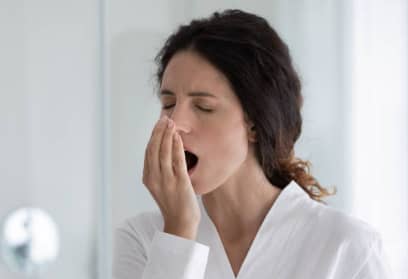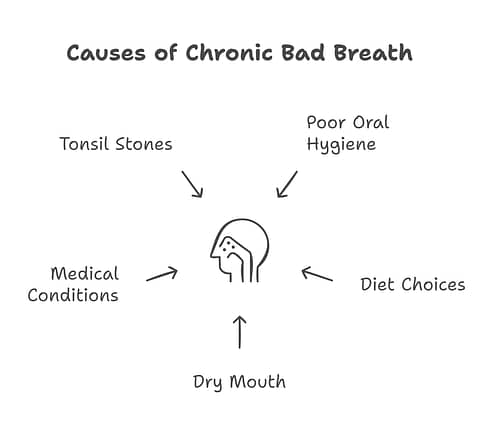Have you ever caught yourself doing the subtle hand-over-mouth breath check before an important meeting? You're not alone. Bad breath is one of those universal human experiences that we all deal with at some point – kind of like getting caught in the rain without an umbrella. While morning breath or garlic-induced situations are totally normal, persistent bad breath might be trying to tell you something more important about your health.
I've spent years helping patients tackle this common but often embarrassing issue, and I'm here to tell you – there's usually a solution within reach. Let's dive into everything you need to know about bad breath (or as we dental pros call it, halitosis) and how to keep your breath fresh and confidence high.

What is Bad Breath?
Bad breath, or halitosis if we're being fancy, is more than just the aftermath of your favorite garlic bread. It's an unpleasant oral odor that can range from the occasional morning breath to a more persistent issue that might make you think twice about close conversations.
Think of your mouth like a busy kitchen – when everything's cleaned regularly and running smoothly, things smell fresh. But leave some dishes in the sink overnight (or skip a few brushings), and well, you get the picture. The difference between occasional bad breath and chronic halitosis is like comparing a cluttered countertop to a full-blown kitchen disaster.
I've seen how bad breath can impact people's lives – from the sales executive who's hesitant about close-up client meetings to the teenager who's self-conscious about school presentations. It's not just about the smell; it's about how it affects your confidence and social interactions.

Common Factors Contributing to Bad Breath / Halitosis
Root Causes of Bad Breath
Let's get to the root of the problem (pun intended). Understanding what causes bad breath is your first step toward fresher breath.
Poor Oral Hygiene: The Usual Suspect
Picture your mouth as a bustling metropolis of bacteria. Most of these tiny residents are harmless, but when food particles are left behind, these bacteria throw a decomposition party that nobody wants to attend. This is why cleaning your entire mouth – teeth, gums, and tongue – is crucial. Think of plaque as unwanted party guests that, if not shown the door regularly, will overstay their welcome and cause trouble (in the form of cavities and bad breath).
The Professional Touch
Skipping dental visits is like ignoring your car's maintenance schedule – eventually, something's going to break down. Those six-month checkups aren't just about polite conversation and a new toothbrush; they're essential for catching and preventing issues that can contribute to bad breath.
When Your Mouth Gets Too Desert-Like
Saliva is your mouth's natural cleanup crew. When production slows down (due to medications, medical conditions, or simply sleeping), bacteria get bold and multiply, leading to that notorious morning breath. Some medications can be particularly drying – I always tell my patients to mention any unusual dry mouth to both their dentist and doctor.
Tobacco: More Than Just Smoke
If you're a smoker or tobacco user, you're essentially giving bad breath a VIP pass to your mouth. Not only does tobacco leave its own unpleasant calling card, but it can also inflame your gums and increase your risk of gum disease. Trust me, your breath is just one of many reasons to consider quitting.
When Your Body's Trying to Tell You Something
Sometimes bad breath is like a warning light on your dashboard – it could signal infections from recent dental work, sinus issues, or even chronic conditions like acid reflux or diabetes. I once had a patient whose persistent bad breath led to the discovery of an underlying sinus infection they didn't know they had.
You Are What You Eat
While that garlicky pasta might be worth it for dinner, certain foods can leave a lasting impression on your breath. High-sugar and acidic foods are particularly problematic – they're like all-you-can-eat buffets for odor-causing bacteria.
How to Prevent Bad Breath
Prevention is better than cure, and when it comes to bad breath, a few simple habits can make a world of difference.
The Daily Defense
Your oral hygiene routine should be as reliable as your morning coffee. Here's what that looks like:
- Brush Like You Mean It: Twice daily, two minutes each time. Timing matters too – wait about 30 minutes after eating to avoid brushing acids into your enamel.
- Floss Like a Boss: Whether you're team string floss or team water flosser, getting between those teeth daily is non-negotiable. You'd be amazed at what can hide between teeth!
- Show Your Tongue Some Love: That white coating on your tongue? It's basically a bacteria bed and breakfast. A tongue scraper can be more effective than your toothbrush at evicting these unwanted guests.
The Supporting Cast
- Rinse Wisely: Think of alcohol-free mouthwash as a supporting actor, not the star. It's great for freshening up, but it can't replace the main players (brushing and flossing).
- Stay Hydrated: Water is your mouth's best friend. It helps maintain saliva flow and keeps the bacterial party under control.
The Treatment Playbook
Sometimes, despite our best efforts, bad breath persists. That's when it's time to call in the professionals.
Professional Interventions
A professional cleaning is like a reset button for your mouth. Your dental team can remove built-up plaque and tartar that your at-home routine might miss. They can also spot and treat underlying issues like gum disease or cavities that might be contributing to the problem.
The Bigger Picture
Your mouth doesn't exist in isolation – it's connected to your overall health in fascinating ways. Poor oral hygiene has been linked to serious conditions like heart disease and diabetes. Think of maintaining good oral health as an investment in your whole body's wellbeing.
Time to Take Action
Bad breath doesn't have to be a constant companion. Whether you're dealing with occasional morning breath or a more persistent issue, you now have the knowledge to tackle it head-on.
Start with the basics – amp up your oral hygiene game, stay hydrated, and pay attention to what your breath might be trying to tell you about your health. And remember, your dental team is just a phone call away if you need backup.
*[Insert image suggestion: A friendly, professional dental team working with a patient]*
Ready to take the first step toward fresher breath and better oral health? Schedule a check-up with your dentist – your future self (and those close-talking colleagues) will thank you.
Remember, everyone deals with bad breath sometimes, but with the right knowledge and tools, you can keep your breath fresh and your confidence high. After all, life's too short to worry about what's on your breath instead of what's on your mind.
FAQ
Q: What is halitosis and how does it relate to bad breath?
A: Halitosis is the medical term for chronic bad breath. It's a common condition that affects many people and is often caused by bacteria in the mouth. Understanding bad breath, also known as halitosis, is crucial for maintaining good oral hygiene and overall dental health.
Q: What are the main causes of bad breath?
A: Bad breath can be caused by various factors, including poor dental hygiene, dry mouth, certain foods (like onion and garlic), tobacco use, and underlying health conditions. Bacteria responsible for bad breath thrive on food particles left in the mouth, producing an unpleasant odor. Regular dental care and maintaining good oral hygiene are essential for combating bad breath.
Q: How can I maintain fresh breath throughout the day?
A: To maintain fresh breath, brush your teeth at least twice a day, floss daily, and use a tongue scraper to remove bacteria. Drink water throughout the day to stimulate saliva production, which naturally cleanses the mouth. Chewing sugar-free gum and eating crunchy fruits and vegetables can also help freshen your breath by stimulating saliva flow and removing food particles.
Q: How often should I brush and floss to prevent bad breath?
A: To maintain good oral hygiene and prevent bad breath, you should brush your teeth at least twice a day and floss daily. This routine helps remove food particles and bacteria that can cause bad breath. Additionally, using a mouthwash can provide extra protection against bacteria and freshen your breath.
Q: Is dry mouth linked to bad breath?
A: Yes, dry mouth is often linked to bad breath. Saliva production plays a crucial role in cleansing the mouth and neutralizing acids produced by bacteria. When your mouth is dry, bacteria can multiply more easily, leading to bad breath. Staying hydrated and using saliva substitutes can help combat dry mouth and improve your breath.
Q: How can regular dental visits help in preventing bad breath?
A: Regular dental check-ups are essential for maintaining good oral hygiene and preventing bad breath. Your dentist can identify and treat issues like gum disease, which can be a source of bad breath. Professional cleanings remove plaque and tartar buildup, which harbor bacteria responsible for bad breath. Dental visits also allow for early detection of other oral health problems that might be exacerbating bad breath.
Q: Are there any specific foods that can help improve bad breath?
A: Yes, certain foods can help improve bad breath. Crunchy fruits and vegetables like apples, carrots, and celery can help clean teeth and stimulate saliva production. Yogurt with active cultures can help reduce odor-causing bacteria in the mouth. Herbs like parsley and mint are natural breath fresheners. However, it's important to note that while these foods can help, they are not a substitute for regular brushing and flossing.
Q: How is gum disease related to bad breath?
A: Gum disease is closely linked to bad breath. When bacteria accumulate in the mouth, they can cause inflammation of the gums, leading to gingivitis and eventually periodontitis. These conditions create pockets between the teeth and gums where bacteria thrive, producing foul-smelling sulfur compounds. Maintaining good oral hygiene and having regular dental check-ups are crucial for preventing gum disease and the associated bad breath.